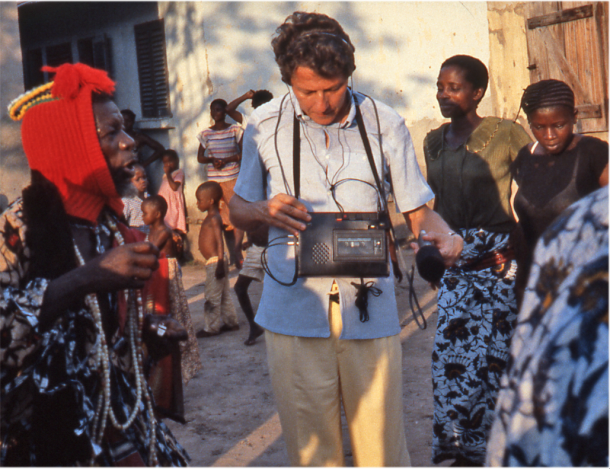



A few days before the announcement of the death of the immense Charles Duvelle, the soul behind the Ocora label, Hisham Mayet goes back to the relationship he had with this musicologist, who showed him the way to create his own label, Sublime Frequencies. A friendship that allowed the publication during the summer of 2017 of a Photo Book, showing photographs taken by Duvelle during this many trips, from West Africa to Eastern Asia.
When and how did you start this book project ?
The project was a result of a meeting I had with Charles Duvelle in November of 2015. I had been wanting to meet him for over 15 years. I finally had a liason (Jharna Bhattacharaya, widow of Deben Bhattacharaya) make the formal introductions. I visited him at his home in Paris and we immediately became fast friends. We shared many of the same philosophies in regards to the work we had both been doing in regards to musicology. He wanted to work on something together, so I proposed a book detailing his wonderful photography during his years recording with the Ocora label.
What was your perception of the Ocora label, a model for Sublime Frequencies?
Ocora was certainly for me, one of the biggest inspirations for Sublime Frequencies. It was the first name given in our mission statement of many influential labels that had inspired my record collecting and various recording expeditions.
You published a long interview with Charles Duvelle… We learned a lot of stories about the venerable sound researcher, who was a reference for David Byrne and Brian Eno, among many others. For example you described how Duvelle was at Fela’s home in 1977, a day before the republic of Kalakuta was attacked by the Nigerian forces! A true novel character?
The stories that Charles had given me would take an entire book to disclose. To say that he had many fantastic experiences is an understatement. There were many that would not fit in the narrative of his work for Ocora, so as you can imagine, recording all over the world for 40 years, there are many more stories.
There is a lot of cliches about ethnomusicologists, often seen as rather austere people, researchers disconnected from the realworld but Charles Duvelle was different. Did that aspect surprise you?
Yes and no. I was surprised by how accessible he was once I became friends with him. I think before the age of constant social media surveillance in the present time, most people seemed much more inaccessible. Everyone now is trying as much as possible to market themselves via social media. But you have to realize before this phase, people could exist in the shadows without trying too hard. Charles was certainly not looking to be a celebrity in the sense of an attention seeker. He is a private man and his work as a composer is a private art, so in a sense he just liked to be out of the spotlight.
Do you think that today it is still possible to a similar work to Charles Duvelle’s?
Yes. I feel like I’m the extension of what Duvelle has been doing. My work with Sublime Frequencies certainly carries the legacy of what Duvelle has started. There are many others today that are continuing the process of traveling and recording all over the world. Its quite different now, because the technology is different and there are less surprises in the world. It seems with the Internet and Youtube, almost every story and music has been discovered. BUT, there are always surprises to be found and discovered.
How have you worked together for the selection of pics? Was there a lot? Thousands?
There were several hundred photos in his archive. Charles sent me all he had available. I went through every photograph and chose what I felt represented a rich tapestry of photographs that had a nice composition, showed many types of instruments, had a broad geographic area, etc. I chose a combination of black and white and color photographs. Many were unpublished. It would have been a 500 pages book had we included most of the photographs.
Sakara Orchestra from Benin
Do you think that just like with the music, the images of the Ocora label show us a world that has since disappeared?
Yes and no. Most of the people he photographed are no longer alive, and a lot has changed in the respective areas where these images were taken. Modernity and «progress» is constant. All these areas have been affected by technology. But, I’ve done a lot of traveling to the same areas that Duvelle traveled to and many times, the same scenes can be found today. It’s becoming less and less so, but there are remote areas that have remained relatively the same.
You are publishing unreleased tracks to accompany the reading. Can we expect a vinyl edition of these gems?
Yes, in the future, many vinyl projects will come for the Duvelle archive! And also, the music of Charles Duvelle will be published as well. He was a brilliant composer on piano and the Prophet synthesizer.
And are there other unreleased tapes on Ocora?
I’m not really sure. There were many recordists working for Ocora and I do not have access to all the archives. It’s quite difficult to ascertain how much material has been unpublished.